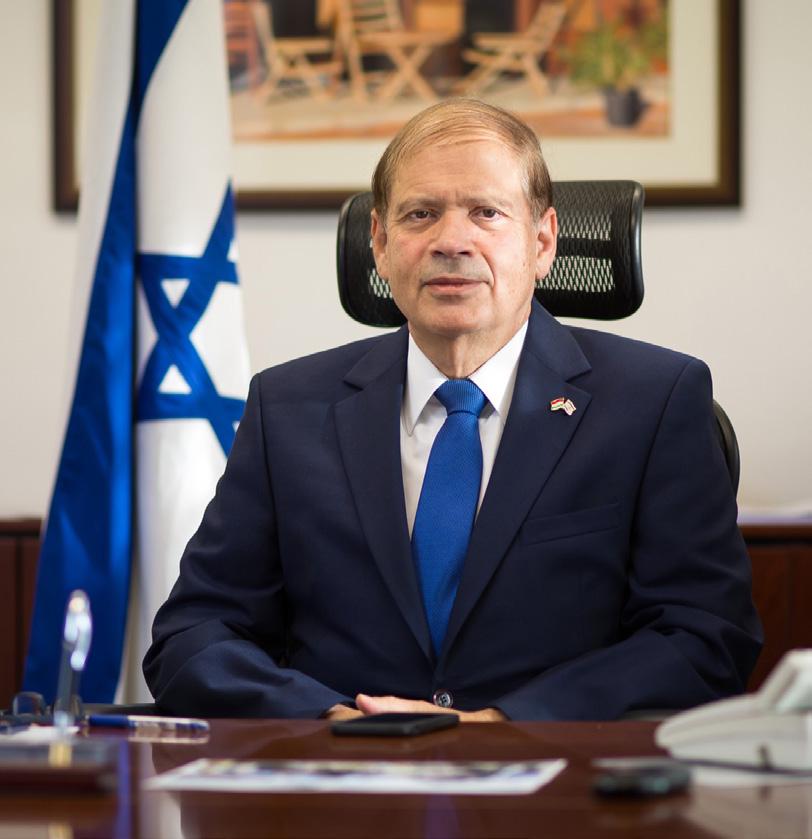
3 minute read
Antall József Knowledge Centre
Since its inception in 2010, the Antall József Knowledge Centre (AJKC) in Hungary has introduced a variety of events targeting Hungarian students enrolled in higher education, as well as domestic and international professional audiences. The Knowledge Centre is named after József Antall (1932–1993), a Hungarian teacher, educator, librarian, historian, and statesman, who served as the first democratically elected Prime Minister of Hungary after the fall of communism (from 23 May 1990 to his death on 12 December 1993).
The Knowledge Centre’s main objectives, in line with Antall’s philosophy, include managing talent and providing students and young professionals with wide-ranging practical knowledge through various events. The Knowledge Centre is a foreign policy think tank researching topics such as the Visegrad Cooperation, the future global role of the EU, the US, China, issues of the Middle East and Far East, security policy, as well as technological and social innovation.
Advertisement
The whole of AJKC works towards strengthening institutional relations both at a national and international level, developing scholarship and internship programmes, and boosting professional cooperation via international conferences, workshops, and event series. Our institution’s main office is located in Budapest, operating with two international departments, focussing on European and global relations, respectively, a research department, and a thematic department, covering areas such talent management and innovation. In addition, AJKC has a regional office in Győr and an office in Brussels, which was established in 2015 to represent the Antall philosophy in the heart of the European Union and to promote the values that he stood for at an international level.
The publishing activities of AJKC involve releasing professional publications, scholarly works on political and social sciences (with special regard to security policy and international relations), as well as university textbooks. In our autobiographical series, prominent personalities of the Cold War period, including Ronald Reagan, George Bush, Margaret Thatcher, and Helmut Kohl, recount crucial years and decisions still affecting their lives. Reacting to events of political, social, and economic significance in the 21st century, the professional publications series of the Knowledge Centre features works incorporating the latest results of international relations and geopolitics, the history of politics, economics, and psychology.
The AJKC’s most ambitious professional event is called think.BDPST. The conference, organised in cooperation with Hungary’s Ministry of Foreign Affairs and Trade and supported by the International Visegrad Fund, focusses on regional development and the new perspectives of research, innovation, and future technologies. The business world’s most notable, creative and innovative thinkers are all invited to think.BDPST along with actors from NGOs and the political sector to share and inspire one another to develop forward-thinking strategies that will facilitate the development of the whole Visegrad region. The event also aims to position Budapest as an ideal destination for enterprises with a pioneering spirit seeking new horizons, new markets to enter, or a new territory and knowledge base to include in their plans for the future. In 2021, topics covered at the 6th think.BDPST conference include effects of and opportunities offered by digitalisation, with special regard to issues such as the renewing of the economy after the pandemic and the implementation possibilities of digital governance.
The Antall József Summer School is an educational programme for MA and PhD students, as well as young professionals, which examines the Central European region, in particular, the Visegrad Cooperation, and its wider neighbourhood from various aspects through frontal and more interactive forms of education. After a year of hiatus, the Antall József Summer School will return in 2021, focussing on the 30th anniversary of the establishment of the cooperation and its relations with the Western Balkan region. The event will be organised in partnership with the Konrad-Adenauer-Stiftung in Hungary. Each year, the Knowledge Centre organises its Foreign and Security Policy Conference, which focusses on the key diplomatic priorities of Hungary, the Central European region, and the Transatlantic Alliance as a whole, such as the future of NATO, stability in the Western Balkans, and EU defence cooperation. The 2020 event examined security challenges originating from the latest space and cyber technology achievements, while also putting emphasis on the rapid development of information technology and its viral role in our everyday lives and national economies, as well as the new type of arms race and cooperation between national security bodies. The conference series is organised in cooperation with the Konrad-Adenauer-Stiftung and supported by the NATO Public Diplomacy Division.









